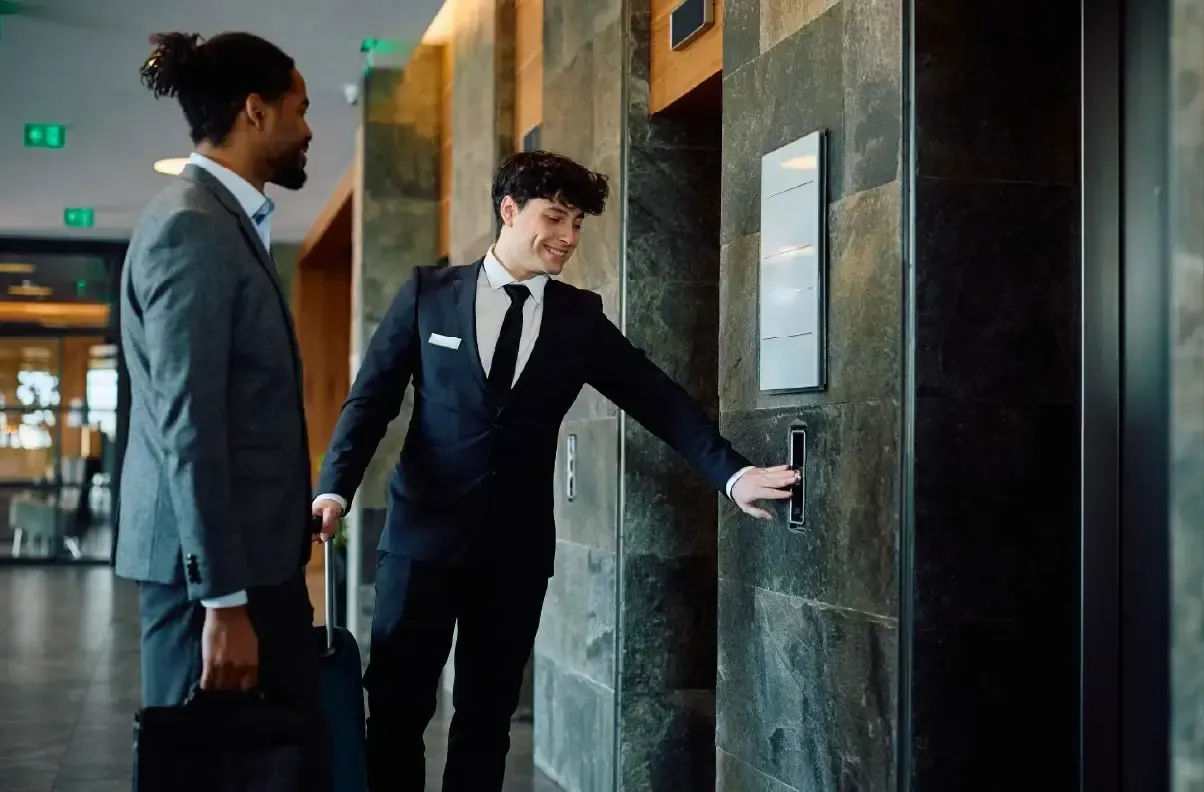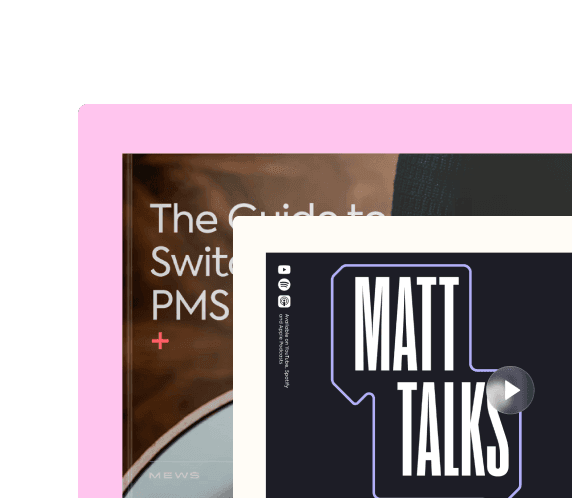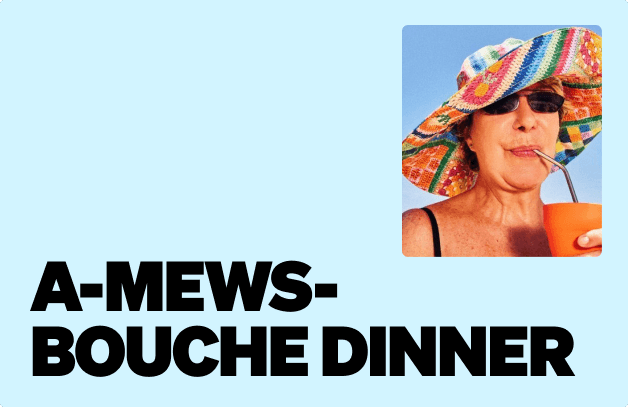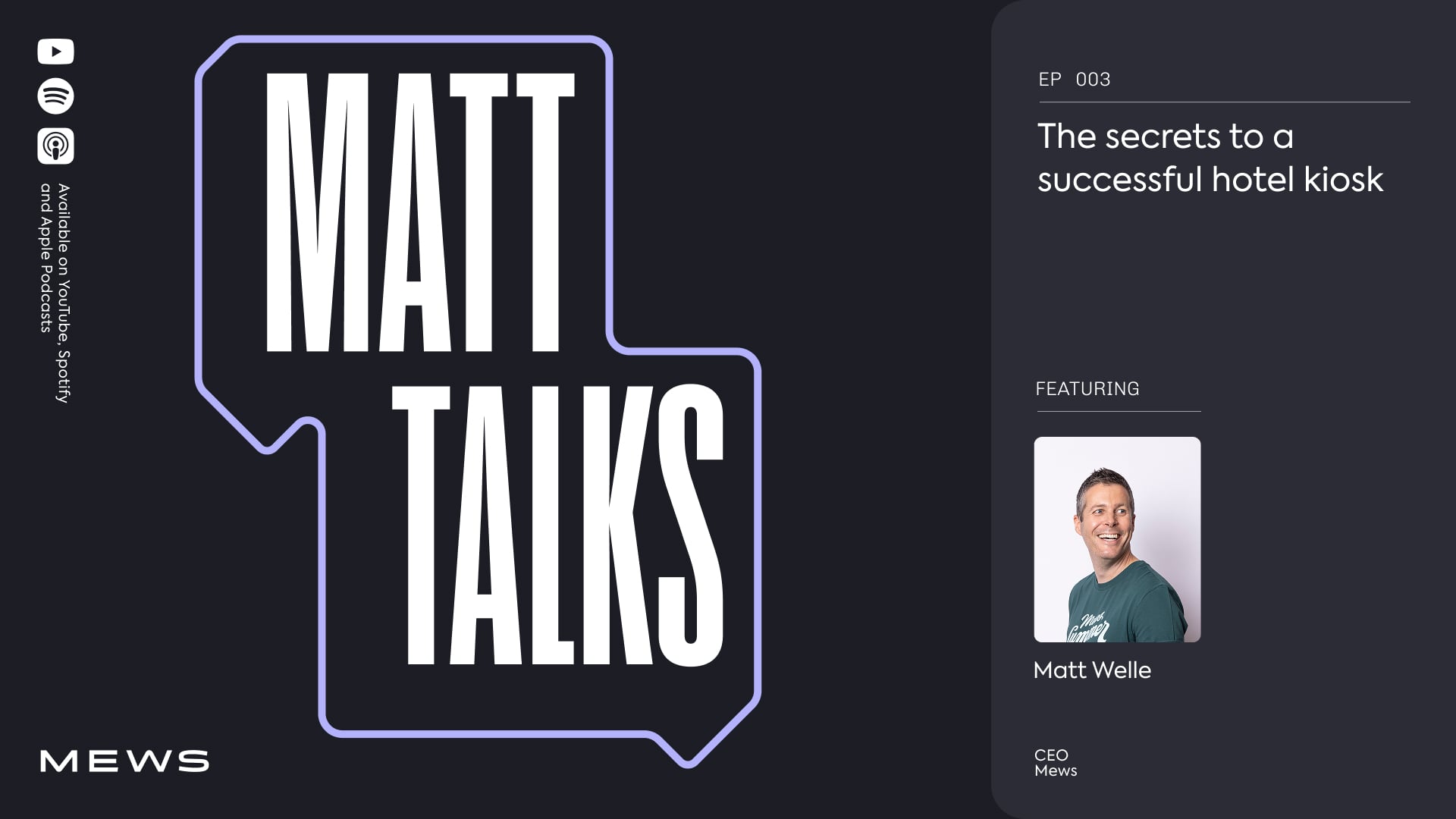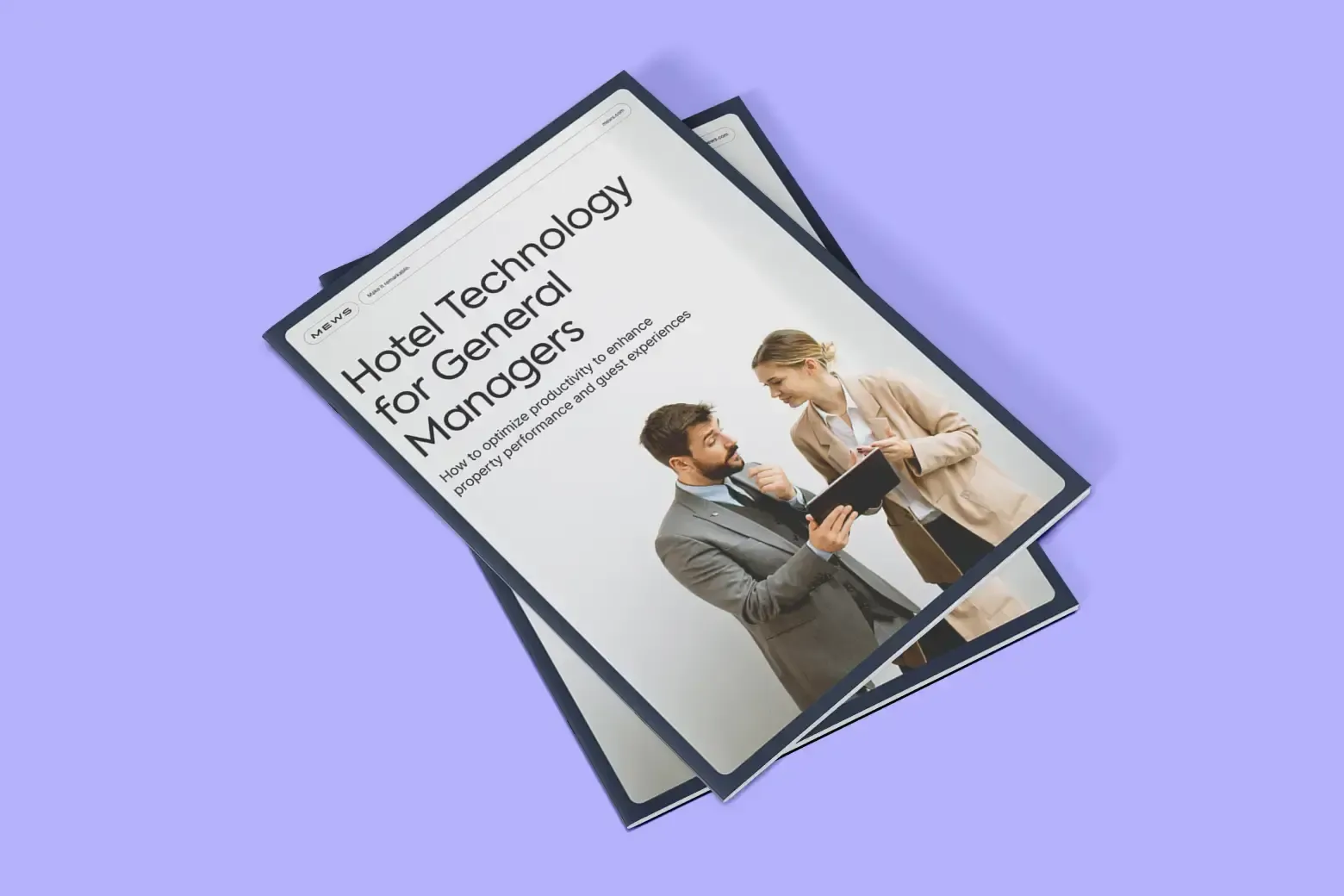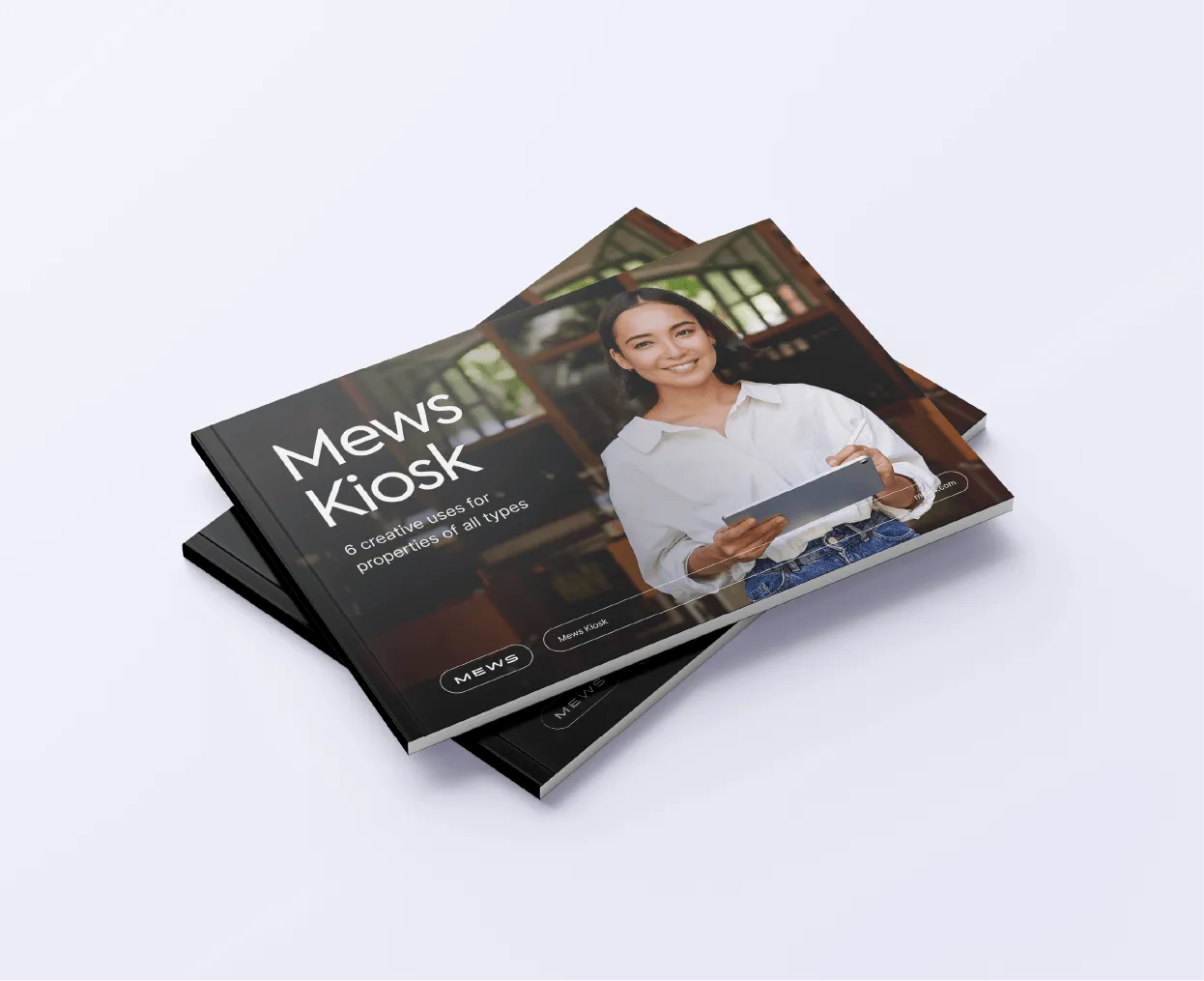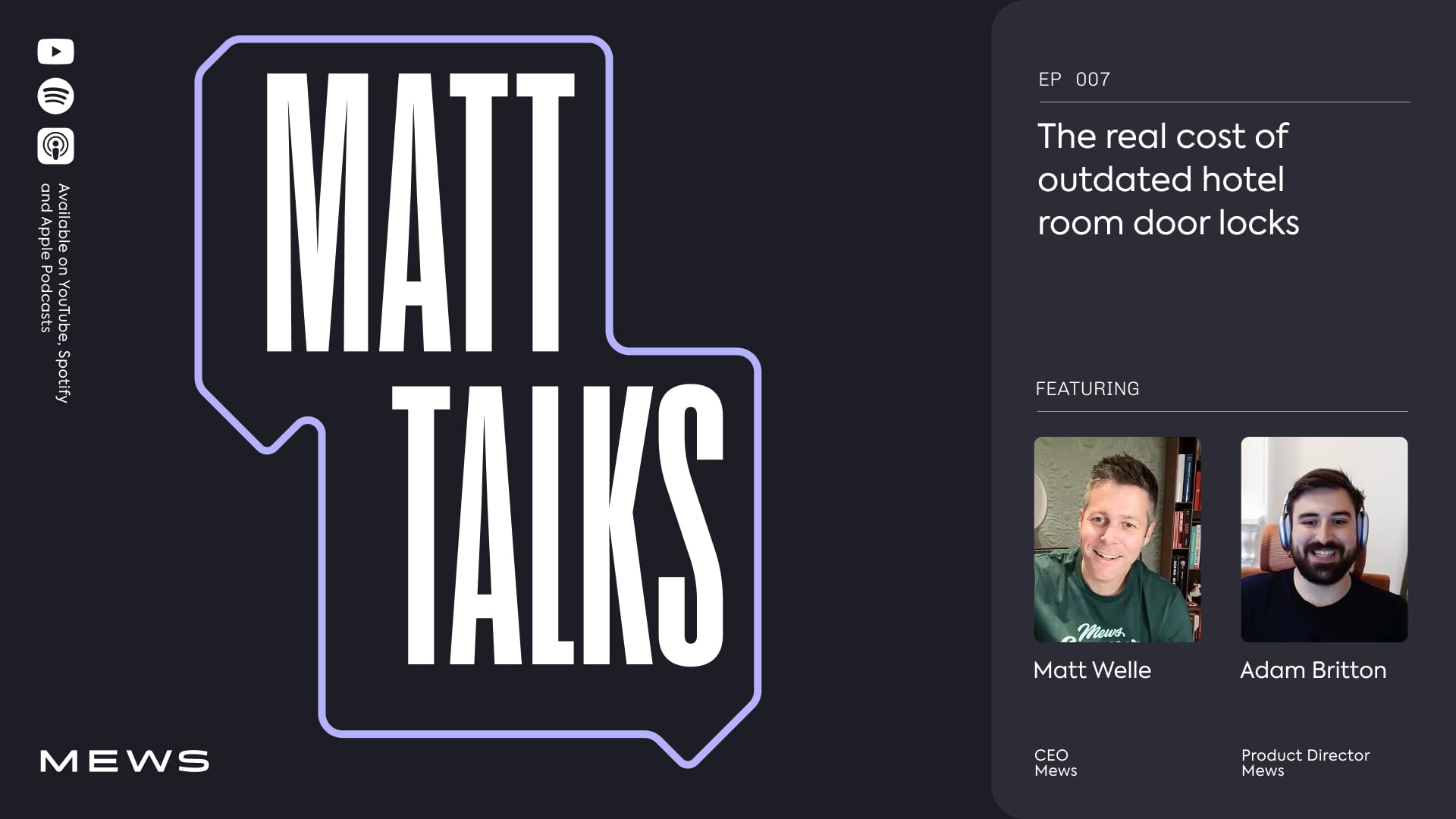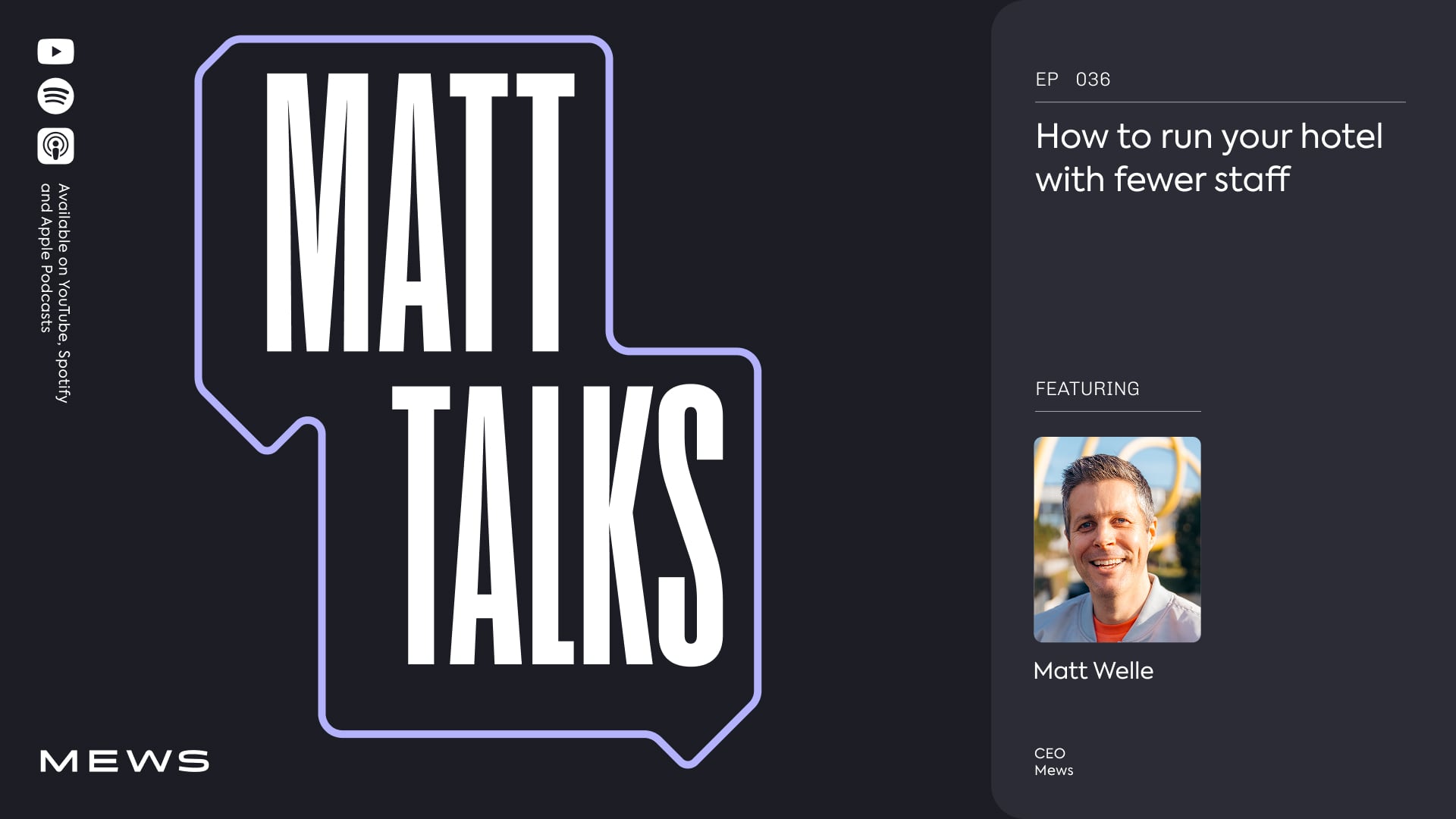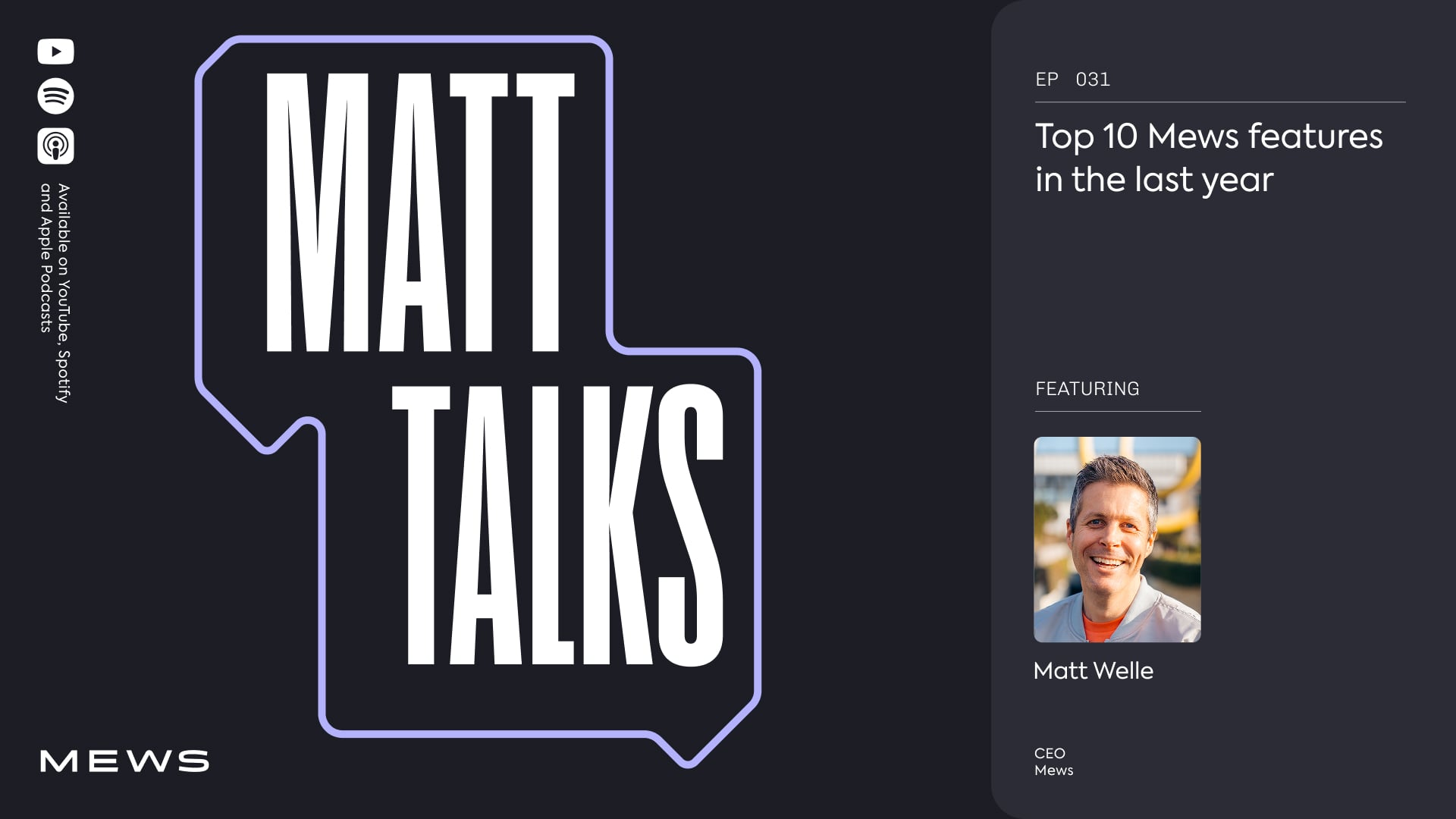What to expect?
Meet your host

Matthijs Welle
CEO, Mews
After years in the trenches of hospitality, Matt joined the Mews journey during its early days in 2013. Since then, he’s been our fearless CEO, leading the company and the industry forward.
Episode chapters
Transcript
Introduction to kiosks in hospitality
Hey, everyone.
As I press record, I just realized I'm literally wearing my wall, so I hope you can see me, in all of this green. Today, I wanted to talk about kiosks. Kiosks have been a real challenging focus for us in the last few years. Initially, when we launched the Mews Kiosk, it really didn't do well.
And then COVID happened, and we saw this massive acceleration of digitization of hotels and hotels embracing a solution like a kiosk that could check a customer in without the need for a human.
But I still see a lot of hotels struggling with how to properly implement a solution like a kiosk. And it's because there are so many options, and there's so many ways to do this well, but also there's so many ways to do this wrong.
I watched this article on CNN the other day, where they talked about how McDonald's has tremendously benefited from rolling out kiosks. Initially, there was this fear that many people were gonna lose jobs, but actually it led to more jobs at McDonald's because it drove more revenue and people were ordering more products. So the kiosk is really good at helping upsell customers to buy more solutions, and that drove to more work in the kitchen. So, actually, it drove tremendous output. But then there was also a comparison to other businesses that actually struggled with getting the kiosk deployed in the right way, and they've actually gone back to, the traditional checkout lines that you're seeing in some supermarkets.
So there's definitely a right way to do it, and then there's a wrong way to do it. I actually think that there's a huge space in hospitality for kiosks. So what I wanted to do is just talk through four different areas of focus as you're thinking about this for your hotel.
The first one is really which types of hotels could do really well with the kiosk and which ones don't really, and why do we still have kiosks. So that'll be the first block that I'll talk through. The second block will be about, what do you want to achieve with it? I think it's important to understand what your purpose of the kiosk is because it can actually do multiple things.
Like, it could replace stuff. It could drive upsells. It could really do a lot of different things. So I'll talk through that in the second block.
The third block is, okay, now that you've chosen that you want a kiosk, what are the most important things that the kiosk actually does, and what are the things you should look out for as you're going on a buying journey for a a solution?
And then lastly, I'll talk about some of the partners. Obviously, Mews has a kiosk, but we're not perfect for everyone. And we've got some great partners that we work with, and just some things to keep in mind as you're going about this journey with your kiosk. So four blocks, and we'll talk through those, individually, and I'm excited to hopefully help you on your journey. But as always, if you have questions, you can always reach out to our team so we can support you in your buying journey towards a kiosk solution for your hotel. Thank you.
Chapter
The role of kiosks in modern check-in processes
The first part is really talking to why do we still need kiosks in a time when you have actually, ready available online check ins, on personal phones because I'd say ninety nine percent of travelers today have a smartphone, and are able to use it for a check-in, for example, into your hotel.
What we're seeing from our data, and we've we've built a very strong native online check-in product.
What we're seeing is that if people have booked on the hotel website, and they're natively in that same product than experiencing the online check-in, one in three guests check themselves in. So, actually, the percentage is pretty high there. However, if you've booked through one of the OTAs, like Booking or Expedia, only one in ten makes it through that cycle because they have these anonymous email addresses. So it's really hard to get through.
We're able to get these numbers up by using our SMS product. So we can send out these SMSes to customers where you have to buy an SMS bundle to not only email the customers to check-in online, but now also you can SMS them if they haven't checked in online a day before arrival. So that works, but you'll never capture the majority of customers because a lot of customers will just miss the the notifications. Unfortunately, they get a lot of notifications whilst they travel, and and some of them just don't succeed at at making it through that, online check-in cycle, or it never reaches the customer.
And some some of the travelers like, if you think about, group travel, you might not have email address or ways to contact those customers. Or if they've booked directly by phone, you might not have their email address. So we see the kiosk as like a last mile solution. So once they get into the hotel, you're struggling because you want to get them into their rooms completely digitally.
But, unfortunately, most hotels don't have digital keys. So, if you don't have digital keys, you need to find a way to get these plastic keys in the hands of the customer. If you do have digital key, unfortunately, no guest will have checked in online, and they will end up having to go to the kiosk. And the kiosk can actually issue digital keys.
So you could have them go through the kiosk, then scan a a QR code where they can download the digital key. But because they didn't do it online, they have to do it on-site, which is, you know, the the the last mile that happens. And that's why hotels still have reception desks because there's humans there to assist you with that last step. So that's why I don't see kiosks going away despite what people think.
Everyone thinks that the digital journey will take over, but it's gonna be very rare for you to have a hundred percent of customers go through that journey unless your entire brand is built towards digitization. And the moment that people book, you engage in that journey and you've really built towards a great digital journey, it's gonna be really hard for you to convert a hundred percent of your guests towards the online check-in. And that's why I think kiosks are not gonna go away, but it does need refinement. I've seen many really bad implementations of the kiosk, and it leads to, people just getting disappointed and saying, oh, kiosks don't work for us.
And I'm like, okay. So where where did you place it? I think that's often the the the thing I get frustrated by because the other day I walked into a hotel and I saw they had sub five percent kiosk check ins. And I'm thinking, this hotel brand is a modern brand.
It should really, adopt this incredibly well. And then I visited the hotel. And, basically, what what goes on, you walk in and the first thing you see is the big reception desk. So, logically, I'm being pulled to the reception desk.
And then I, I looked for the kiosk because I knew that some people were succeeding to check-in, and it was behind the reception desk where it was, like, just in a dark corner of the lobby.
And, obviously, if you don't make the kiosk setup the primary focal points with really clear signage that pulls people towards it, and actually the vocal point is the reception desk, then you're gonna end up with ninety, ninety five percent of customers going to your reception desk defeating the purpose of the kiosk in the in the first place.
So that's why I'd I'd really want to rethink, okay, how do we approach it? If we're gonna go that direction, how do we approach it? And it's really about the hardware that supports the software that sits behind it. Another thing is really that kiosk have more capabilities than what you can do online.
So online, you can do pretty much most things, but it does require some hardware implementation. So for example, if you wanted a complete online journey, you need to upgrade all of the locks on your rooms. And unfortunately, that costs money, which not all hotels have. So a kiosk can actually have a key encoder, linked to it.
Secondly, we can also take payments on terminals on the kiosk. So if the online payment failed, you have a a payment terminal there where you can take direct payments.
And the last thing is, the moment you walk into the hotel, that's the moment you're ready to go to your room. We're not like an airline. Right? So it's not like a a plane that boards all guests at the same time and all of the seats are empty at the same time. We have a gradual flow of check ins and check outs. So whilst you might check-in the day before arrival, we don't know if the room that we've assigned at that point is gonna be vacant because there's another guest there, and we don't know when that guest departs.
So the kiosk is really good because they know you're now in front of me and you wanna go to a room. So it can deallocate and reallocate to the a room that actually is inspected.
And that's a skill that, unfortunately, online is not possible unless you do the online check-in whilst you're in the lobby, but that's a really strange experience.
And and that's really where why I think the kiosks will remain. We will need them. And and I think we need to invest in them more because people have embraced it. You've really seen this in multiple industries. People are used to doing their groceries and going to the kiosk now. Going to McDonald's and you go to the kiosk. So the more we see that, the more the adoption will be and the more efficiency efficiently you'll run and the more upsells you'll hopefully do.
Chapter
Segmenting hotels for kiosk implementation
So part two, I wanna talk about what do you look to achieve as a brand. And, I'll I'll break this into two sections. So the first one is really talking to the different types of hotels and whether they should have a kiosk. And I would like to argue that actually most hotels can embrace the kiosk but in different ways. And then in the second, I I'd like to talk about the spectrum within which you can deploy it because there is a spectrum where they're light touch kiosks and they go full end, to the extreme of of of what what a kiosk can do, but also what the cost of those kiosks will be. So if you remember my first talk where I talked about different hotel segmentation and understanding which segment your hotel falls into is really critical for the experience that you're then building.
So we've got four segments that we work with and and it was two spectrum. So on the one side we said, okay, there's leisure hotels and there's mix hotels where they have leisure and business or business. So the mix hotels are the more complex ones, and then you've got the leisure hotels. And then we look, against whether they are limited service, so they're economy branded hotels, or they're more full service. So they suddenly start to have more facilities like they start having a pool, a gym, restaurants, and bars, and meeting rooms, etcetera.
So if you go to the, the the smallest segments or the the the most limited service segments that only serves leisure guests, for example. So you you, think about a hotel that is a pure leisure hotel outside of the city potentially, that is serving leisure guests. And often what I'm hearing from those hotels is saying, well, Kiosk doesn't work for us because really we only have fifteen, twenty, thirty rooms. And I've I'm employing that receptionist regardless, and I wanna create this really personal experience.
But you're a budget hotel and you want the most out of your staff. And do you really need your staff to type in guest data on a terminal when you want to make them multitask? You you want them to be able to switch to the breakfast room when it gets really busy or in the afternoon to help out in the bar.
And you, through the kiosk, get this, this flexibility from your top from your staff.
So this segment that we call the low cost segment, which is leisure, and it's the limited service, should definitely embrace the kiosk. I think it makes complete sense when you're a, focused on efficiency of of your operation, and just to automate as much as possible.
The other, segment in focus service is the one where you start to serve not only leisure guests but also business guests.
And then you're in the limited service category. So we call this the efficient segment.
And it's kind of in the name of the segment. You're looking for efficiency.
You're a budget hotel. So you want to make sure that you get guests in the room as fast as possible. And because you're most likely to be in a city center location because you're serving business customers, Business customers don't have much patience. They wanna get in their room as fast as possible. Most likely, your length of stay is shorter because you've got business travelers.
So whilst you might still have a full time reception desk, you really wanna make sure that your business guests are routed through the terminals because they might be the most efficient way to get in to get them in the room, but also because you just do more check ins than you would do in a pure leisure hotel. So that's really where the kiosk comes in because they are really, really good at their jobs. They don't make mistakes. They are really routed for efficiency.
Then when you go to the more full service brands, I think this is where the hesitation comes towards deploying a kiosk.
And in here, I'd say if you're a we call this segment the frictionless, segment. When you're a full service brand, so you've got multiple facilities across the hotel and you serve both business and leisure guests, I would say you want to deploy a kiosk because, again, the business travelers will embrace it. Because if they are regular visitors that are coming to your city for business, they will embrace the kiosk because they will know how it works and it makes their check-in really efficient. They're not really looking for a hand holding experience at the reception. They're just looking to get into that room as fast as possible in the most efficient way possible.
So on the frictionless segment, I would say definitely you wanna embrace the kiosk.
Where I think the debate, gets heavier is on the last segment which is personalization.
This is a pure leisure hotel that is also full service. So you've got lots of facilities across the hotel. And I would think that here, it really depends on what your brand is because the kiosk doesn't do all of the selling really well. Because when you go to a full service brand, you obviously want to make sure that your guests are experiencing most of your services of the hotel because that's where you make revenue.
So while the kiosk can do some light upselling, it can never do what a human can do, which is asking customer what they're here to do, how they're looking to spend their time making some spa appointments. So I think if you're on the extreme of full service and, like, really in the luxury segment, that's where you probably will not embrace a kiosk. But if you're in the, you know, starter segment of the full service when you just have a restaurant that's a meeting facility, actually, it might still be the right thing for you. So through this, I think most hotels have a way to deploy a kiosk.
Chapter
Choosing the right kiosk solution
So the second section here is, okay, what kiosk? So if you've said, I want a kiosk, you need to make the next step set of decisions to approach this.
So I think if you're, you know, for example, that low cost segment or or the efficiency segment, so you're in a, like, a limited surface brand, you can go quite extreme on how far you wanna take that kiosk. So for example, if you're a motel by a highway or, you know, a really budget hostel or hotel, you could even go as far as having an ATM outside the door of your hotel so that people can't just walk through the door unless they've got a reservation and they're checked in. So we've seen deployments of those types of kiosks, which are, complete one hundred percent self serve kiosks, and that works extremely well.
But that's really when you're on the extreme side of budget. You would never do that when you're, you know, a little level up.
You've also got fully self serve reception where or kiosks, areas. And a really great example is the Zedwell in London, which is one of our amazing customers. They are on Piccadilly Circus or an Oxford Circus. Now it's Piccadilly Circus, sorry.
And you walk in and it feels a little bit like an Apple store. It's a beautifully designed space around the kiosk. So there's a line of ten kiosks, and it can handle, you know, any amount of people walking in because there's enough kiosks. They don't really cost that much to deploy, and there is no reception desk.
So you do walk in and you go to the kiosk, but there's always someone walking around. So if you do get stuck, there's someone to help out. But the whole lobby is designed around the concept of a kiosk.
Then you you can go a little bit lighter. So you can say, okay. I want the kiosk to help drive efficiency. So my goal is to check-in sixty, seventy percent of people.
But actually for the thirty percent that really wants more support, I'm available.
A a really great example here is the social hub. The social hub have these islands. So you walk into the lobby and there might be two or three of these islands. And an island was a receptionist who has their, their computer. And then you got three kiosks around. So they'll initially point customers to the kiosk to say, go and check-in on the kiosk and let me know if you get stuck, then I can help you out.
But because they are switching between a lot of segments, sometimes guests get stuck or they're confused and they might need some hand held. So every island always comes with a with a with a human that can support the experience.
And then you can go even further down where it's just for overflow.
So the hotel will be built for a normal check-in at a reception desk, but it does get busy. Like, if you're a corporate hotel, on a Monday night at six o'clock is when it usually gets busy. But those corporate travelers are perfect for a kiosk. So you could have a an area where kiosks are deployed. And especially on on those busy times, you could have someone in the lobby directing customers to the kiosks. So you can go as extreme as an ATM on the outside to building a lobby that's just built towards the kiosk to just having a a corner, and it very much depends on the type of segment and the type of hotel that you are and the experiencing that you're trying to create.
Chapter
What to consider before implementing a kiosk
So you've decided you want a kiosk. So what should you be looking for? Because, we obviously have a native product that comes with Mews that's included with all of the PMS customers. And we see that about thirty percent of our hotels have actually deployed the Mews kiosks. And then a a smaller number will select to go to a marketplace partner where they will go more extreme. But what are some of the things you should think about the the workflows, about how to serve your customers.
And we've learned some of these things already. So, objectively, what you need for the the physical kiosk is you need a tablet that you have a nice encasing in. So you need to really think about the hardware. How do I encase this in a nice way so you can, for example, at the basic level, buy a bounce pad, which is this nice cover. But you can go much further if you have a really nice hardware that you build around it so that it feels part of the brand.
You need a key encoder because this is one of the main reasons why people still need the kiosk because we need to figure out a way to get the plastic key in the hand of the customer, and then a payment terminal.
So our kiosks now support digital payments. So for example, if you don't have a payment terminal, we can display a QR code that you can scan so that you can do a digital payment, but it is more frictionful. Like, it's much easier to just have, a a payment terminal linked to it. So you've got three pieces of hardware that you have to embed.
Chapter
Challenges faced by guests at kiosks
So that's the the core piece to to set up.
Then we long you know, we had a hotel, a large hotel with hundreds of rooms in in in Berlin that deployed the kiosk and only the kiosk. And they said, our customers are struggling and it's taking them five minutes to to check-in. And then most customers end up going to a human, a receptionist to check-in because they get stuck. And we thought, what's wrong? So we we ended up flying to Berlin and just standing in the lobby to observe what was going on. And what we saw was, you know, people come up to the kiosk, and it says, you know, your name and your confirmation number to find your booking.
And people are like, my confirmation number. Which confirmation number? Where do I find this number? Because people don't have their confirmations printed anymore.
They just assume that we can find your booking and arrival. And that really became a huge pain point because most of these customers couldn't find their very special confirmation number that they had from their OTA or their travel agents or from Mews. And that became a huge pain point. So we thought, okay.
We should rethink that flow, and we did. So right now on the kiosk, there's a setting where you can still say, I want the confirmation number for all bookings. But we we tell ourselves, like, just think about what you're doing. You're making a really friction full experience.
We prefer where we just ask for the last name. And if that last name has an arrival on that day, we will just allow you to check-in that reservation if it's prepaid. And if it isn't prepaid, we will ask you to pay for it. So the chance of someone checking into a room, for someone else exists because a mister Smith might arrive on the same day. But if we recognize, for example, two mister Smiths, we will ask as a secondary step for the confirmation number. So we have some fallbacks that happen to to guide from from prevent from that happening. So by just asking for last name on arrival, it it just incredibly sped up the the check-in by minutes.
So that really created a very frictionless way to find the booking.
The second thing is really, already capturing the guest's address details, or corporate address details if they have to do this on invoice. It's a really critical piece that we're seeing in specific corporate hotels. So, again, when you have the efficiency and the frictionless hotels that serve business travelers, they wanna make sure that they capture those things on arrival because it makes the checkout experience significantly easier because they can literally just walk out and then they get billed they get sent the bill by email.
So capturing the correct billing address and corporate billing address is really important.
And the amount of details you require in most countries is dependent on the country.
So if I'm, for example, checking into the Czech Republic, I will need to fill in the details for all of the guests. So if I book a two persons room, both of the guests have to check-in according to local law. If I check-in to the Netherlands, really, you know, very limited details are required from the main guest of that of that hotel. So we will have a baseline of minimum requirements, but you can add more fields.
And unlike, the journey on your booking engine on your website, on your website, you do not want friction. You want guests to come into your website, get to the booking engine as fast as possible, and not have any friction. So asking for address details is an an absolute no no on your booking engine. However, on the kiosk, you can have some friction because they're gonna have to check-in some one way or another.
So if they go to the human, they have to fill in the the the the address details anyway. So at this point, you shouldn't be too worried about creating a little bit of friction along that way. So, you can add a few more fields if you wanna capture more of that personal guest data so that you can feed that into your CRM, for example, so you can retarget those guests.
Chapter
How you can upsell at kiosks
Another important thing is upsells. We see very little creativity sometimes in hotels, but upsells are phenomenal. So there's three types of upsells that you can do.
One is an early early arrival fee, especially on the kiosk. This is a thing that works like a charm.
Remember when you walk into the hotel and, often you said, oh, official check time is at three o'clock. Please come back at three.
But sometimes the room is available.
And why not charge a little bit extra for the benefit of checking in four or five hours earlier into that room? I'm happy to pay ten, twenty euros sometimes in order for me to just get into my room and take a shower instead of me wandering around the city, waiting for that three o'clock time. So one of the things we introduced was an early check or early check-in fee so that, and you can set a different fee at different time. So if it's just two hours before three, then it might be a a a lower fee.
And it works really, really well. But the thing to remember is that when you implement it, you also need to work with housekeeping, making sure that housekeeping is tech enabled and that they are on their smartphones and that they are putting the rooms back into operation as early as possible. And this has been a great way for hotels to make a little bit of extra revenue that you wouldn't have made before for the exact same room. So that's one type of the upsells.
The second one is upsell of the room category. So, obviously, you want to make sure that they buy into a higher room category if you still have those rooms available. And then the third one is products. So, and a big one is often, breakfast.
If we see that they don't have breakfast attached to their reservation, you can offer them breakfast products. But you could also add other products. So, for example, if you know it's your birthday or someone else's birthday that you wanna order a bottle of champagne. And I'd say always always have four or five different upsell products that are really interesting and relevant and engaging to for the hotel because people actually buy them.
And because the kiosk you know, why McDonald's is so successful with the kiosk is because the the kiosk will always ask, would you like fries for that? And it's visual. It will show you the different products unlike the humans. I have stayed in hotels, for more years than I can count.
I have never been tried to be upsold into a higher category room, and and I really stay in hotels every single week. But to get employees of your hotels comfortable to upsell, it's a lot of training. The kiosk has no shame. It will just say, hey, Would you like this product?
If you don't, great. We'll skip past it. But by just offering it, we're seeing that people are buying these products incredibly, fast.
Chapter
Payment processing and key management
Lastly, it's obviously important that the kiosk takes payments. So because you don't want anyone to enter the room without having captured payments. Most of those flows you can do in if you're you have a modern PMS, you can set up your your automatic payment flows because you wanna make sure there's as little friction as possible. Because if you don't have to take payments on kiosk, it just cuts out at probably a minute from that check-in.
So try and set all your rates rules to charge beforehand, but there's always a terminal there to charge. For example, if they bought that upsell, you might wanna take payment for that, at the kiosk. And then lastly, the room key. So that's the last step that you have to do is, you know, once the room is allocated, everything is paid for, you need to get the room key in the hands.
And it it it does matter, to make sure that you have a integration with your door vendor provider and that you have a video. So we've, allowed people the opportunity of recording a video of what the user feel is, of how to cut a key because some of these, RFID encoders, you know, they they are tap on top, on the front, and you wanna just make sure that no one gets stuck in that piece of the journey. And then the last stage is just telling customers saying, you're in room one zero one. It's on the first floor.
Elevators are to your left so that you have that last kind of, step there.
And remember that once the guest is checked in, they have not yet been in touch with a, an employee of the hotel or host at your hotel. So they might have further questions. So what you could do as a last stage is is upgrade, your CRM, that, for example, sends an SMS to customers saying, hey. Welcome to the hotel. If you have any questions, we've got a live chat on WhatsApp where you can ask us any questions because they don't have a live receptionist there that they might have engaged with. And that's a really great way to just make sure that you've covered all of their requests, that they're having.
In this last and fourth section of this this, Matt Talks, I wanna just talk about, you want a kiosk, who do you go to? What what are the decisions that you're making? Obviously, Mews, we have a kiosk, and, you know, it's complimentary to our guest to our customers.
We're seeing about thirty percent of hotels adopting it. But there is a a wide plethora of, of some hotels that are, you know, deploying it and are really not doing well with it. And you've got some hotels that are doing extremely well. If you're considering news, make sure that we refer you to a customer where we see really strong adoptions that you can get a great reference. This hotel that I talked about earlier, in an earlier video where they had sub five percent because when I walked into the lobby, it was a reception desk and there was a hidden corner with the kiosk.
That hotel is now doing close to seventy percent because we made a conscious decision to support them. And we said, okay. Let's holistically step back and say, where should this kiosk be? Should it be the first thing that guests see when they walk in the lobby? And that's what we ended up doing. We said, okay. Put in a beautiful desk here, implement the kiosk in the right way, have the right signage get guiding guests, you know, great signage on the floor or or coming down from the ceiling.
And we need to get the team comfortable to point customers to the kiosk so that when a guest goes to a person saying, have you checked in on the kiosk? Let me help you with that. And and it does require training. But what we've seen is because this hotel has now gone from five percent to seventy percent adoption on the kiosk, they're doing significantly more upsells because their teams were in upselling before. So we're seeing more of these early arrival, early check-in fees, but also some of these upsell products like breakfast being added, which is really fantastic results that we're seeing.
So Mews is an out of the box solution where you just download an app. You can buy your own Apple or Android device, and you can set it up yourself. But it does require some more effort than just putting it in a dark corner, forgotten lobby, and then be disappointed with it.
But then there are some brands that are truly unique. They have a beautiful branding, and they wanna make sure that the kiosk is customized to their branding. And that is not a a thing we do. We do one product.
We've really optimized it for the best best user flow, but it doesn't allow for a huge amount of customization to the way that you want it. So you we couldn't do different workflows. We we've created the workflow that works best for, you know, over a thousand hotels, and that's what we double down on. But if you want something really customs, there are great partners.
So, for example, two great partners that I see in the marketplace are performing really well are, for example, Enzo Systems, which is a Dutch supplier, e n z o systems.
And another one is a French supplier, which is Ariane. And we've got a great partnership with both of them that can really work with you on deploying the best kiosk possible that is customized to your needs. And one of the nice things that I love about these is that it's truly one, one piece of hardware where everything is beautifully embedded. And, for example, it could, spit out keys, right, so that you don't have to have a stack of keys on the table. It it could be much beautifully more beautiful execution, that comes out of a box. So you don't have to worry about how do I how do I build this hardware nicely into my, infrastructure. It's a beautiful kiosk that's delivered by that, but it comes obviously at a higher cost.
So that's the two partners that I'd recommend on the kiosk site where we see real success in our marketplace.
In my last video, I also talked about, well, what what happens when the guest is checked in and making sure that you follow-up with them saying, welcome to the hotel. If you have any questions, you can contact us, you know, on this channel, like WhatsApp channel, for example.
And we see a lot more engagement from guests on digital channels because they've now checked in digitally. They've not actually met with an employee, and something might be wrong in the room, and you wanna give them a way to respond.
Chapter
Engaging guests post check-in
And there we see, for example, the number one, platform that we're seeing in our marketplace is Duve. HiJiffy is is is a number two. We see, for example, BookBoost. So these three platforms are all ensuring that you can send out messages proactively to your guests to engage them and make sure that you capture their feedback before, they check out and do something about it.
And then lastly, you know, make sure that when you deploy the kiosk that you test it. You walk in through the door and say, okay. Am I seeing it? Is it visually the thing that I'm being drawn to?
And do a few check ins yourself and train the staff. Make sure that they've experienced it and seen how easy it is because it really makes a difference when everyone in the hotel is comfortable and loves the kiosk, to drive the best guest experience possible.
Chapter
Final thoughts on kiosk implementation
Good luck with setting it up. I I love seeing how in the past few years, there's been such a transformation in hospitality, and people are really embracing it. And the results we've seen in some of the hotels that have truly done a great job have been outstanding.
Unfortunately, still a lot of hotels, have underwhelming results, and I'm hoping that some of these videos will help them push those results up and and and have even more success in their hotels. Thank you for sticking with me.



